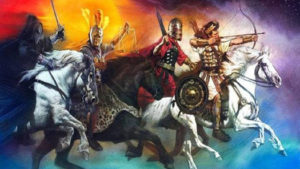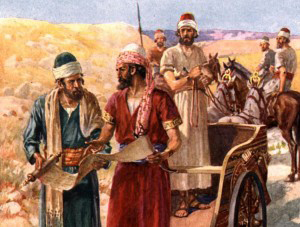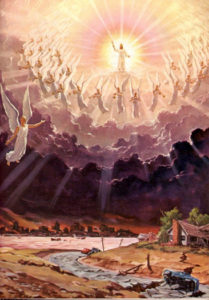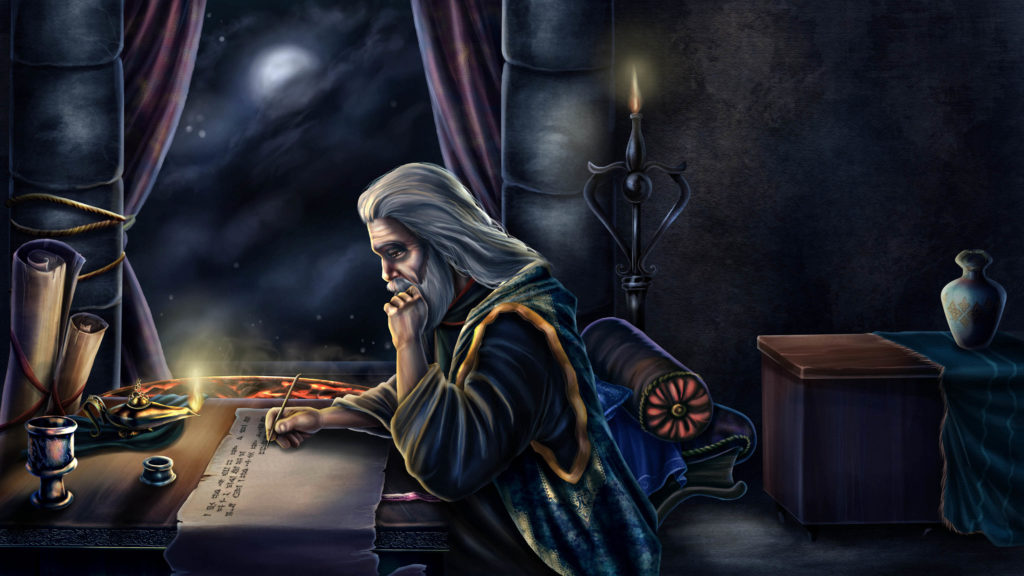There’s just so much stuff out there nowadays having to do with an apocalyptic view of the future. Movies, TV shows, books, almost anywhere you look, there’s often a sense of foreboding about our future. A large percentage of people in many countries have an interest and concern about it all.

At least a good number of those folks have heard of “The book of Revelation”. Maybe they haven’t heard much but they’ve heard that it’s the last book in the Bible and it’s supposed to be about the future and “the end of the world”. Really a lot of people don’t know too much more about it than that.
So if they’re really curious or concerned, they might go to a talk about Revelation or watch a movie or read a book about it. That’s good in a way. They’re trying to search and seek, trying to understand and I’m sure God will honor that. “Blessed are they that do hunger and thirst after righteousness for they shall be filled”, Jesus said. (Matthew 5:6) But it also reminds me of how it was when I first came to believe in God and so I decided I needed to read the Bible.
Everybody knows that when you read a book, you start at the beginning, right? So I did; I started at Genesis in the Old Testament and faithfully read through the whole thing. If I’d had any instruction at the time, someone would have likely told me that the best would have been to maybe start out with the Book of John or Luke in the New Testament, rather than trying to plow through all the genealogies in the Old Testament.
And it’s the same with the many ones who are trying to go to the Bible for answers about the future of the world.

In Acts 8, Philip met an Ethiopian official on a road and he “just happened” to be reading some very significant prophecy passages from Isaiah at the time. (People read out loud in those days and so Philip knew what the Ethiopian was reading.) Philip called out to him, “Do you understand what you are reading?” the Ethiopian answered back, “How can I except someone should guide me?” So Philip explained the scriptures the Ethiopian was reading from, Isaiah 53, an amazing prophecy about the coming Messiah. The Ethiopian got baptized right then and there and went back to his country as a Christian. It’s an amazing passage showing the importance of the need for guidance for those who are new to the Bible.
And this is where it’s really important about understanding prophecy. Because, from my experience, starting with the book of Revelation is really a tough way to begin. I’d suggest a good foundation in the prophecies of Daniel first. Why? The book of Daniel is the foundation on which Revelation is built. Daniel is like the skeleton, Revelations is the skin and organs. The book of Daniel is the foundation and frame of the house, Revelation is the walls and windows.

I don’t know whether to be saddened or amused by some of the things I hear that people are teaching from the book of Revelation. It is a difficult book in a way, rather like a movie that jumps back and forth, forwards and then back again on a time line. Also some of it is clearly symbolic and other parts are literal. Over and over again this is taught all different kinds of ways by various teachers, some of whom who have obvious political agendas.
When asked about the future, Jesus specifically pointed His disciples to the book of Daniel. “When you shall see the [future events] spoken of by the prophet Daniel, whoever reads, let him understand.” (Matthew 24:15) God isn’t going to contradict Himself. And the basic timeline of endtime events is reiterated and spelled out in a progressively unfolding fashion as the chapters of Daniel go forward. This is my primary purpose in doing this video series: to lay out the truths that the Lord revealed to Daniel which Jesus Himself talked about and Paul the apostle also touched upon, all before the book of Revelation was given to John as the last book of the Bible.
So, do yourself a favor: don’t read the book of Revelation, ha! Unless of course you already have a pretty good “foundation for your building” by having gone over the book of Daniel. And if I can be of a service to you, you could start with the 27 minute video I did, “An Introduction to Prophecy in History”. After that there is the “Daniel Chapter 2” video and the “Daniel Chapter 7” video already completed and ready for viewing. They are made for those who are seeking answers to the questions that so many have on these things. Hopefully these videos and the others which are in the works will lay out the basics for you enough so that you can read Revelation and begin to make heads or tails of it. Who knows, maybe I’ll have time to do a video series on Revelation as well. But for you and for me, I recommend you really find out what Daniel was shown first.

Hello,
God bless you,
your idea is great, I like it. I suppose you are going to mention the prophecy of the 25 years to explain how the Jews ended up in Babylon ( I think it’s in Daniel 9). And by the way, I wish to make a comment about Acts 8 and Philip baptising the Ethiopian:
In John 1, we learn that people were getting baptised long before Jesus came. As Mo says baptising is the mere washing of the body by water illustrating a inward purification. In the Hebrew culture it’s called an ablution. Other religions are practising it. So there was nothing new about it and as we read John 1 we see that even the Jews came to John the baptist to be baptised by him. Also we read that John the baptist had disciples. John who was his disciple received from John the baptist this instructrion : “but he that sent me to baptize with water, the same said unto me, Upon whom thou shalt see the Spirit descending, and remaining on, the same is he which baptizeth with the Holy Ghost…” and then John with the other disciple, Andrew, decide to follow Jesus. Andrew is Simon Peter”s brother and they are from Bethsaida, a small village. Now Philip is also from Bethsaida so they all know each other as in those time people were genetically related and of course they all know about water ablutions and baptizism. So these guys even after joining Jesus were continuing the baptizism culture but Jesus did not. So it is no wonder to me that Philip would require from the Ethiopian to be baptised.
Now Jesus wanted twelve disciples to be permanently with Him and one of them was not really a disciple. In Acts 1:24-26, the 11 disciples when they had not yet received the Holy Ghost took Matthias with them but Matthias was not God’s choice. God had chosen someone not entirely Jew and completely out of the baptizism culture : Saul of Tharsus, Paul! And Paul litteraly started the revolution, he completely put aside the baptizism thing in 1Corinthians 1: “The lord did NOT send me to baptise, He send me to evangelize, (preach the Word. The Word, the Word, the Word!) Boom!
I say if you can see that you can accomplish something. It fits more what John the baptist said : I must decrease and He must increase!
In John 1:45 we read that Jesus is introduced as Jesus of Nazareth, the son of Joseph… Normally the grammar would compel us to say Jesus FROM Nazareth, the son OF Joseph… and if you know “Ben Hur”, you must know that “ben” is some Arabic preposition meaning “son of” like Ben Bella or Ben Barka. Here it’s an ID, Jesus is NOT the genetic son of Joseph but legally he is so it’s an identification and that shows that obviously they did not know yet about the miraculous birth of Jesus and probably they will have some trials beleiving it.
This is what Iwanted to say. Ok ?
I am waiting to read those classes on Daniel! GB